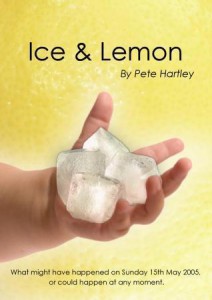I recently finished reading a novel called Ice & Lemon, which was given to me by my mother for Christmas (my reading list is quite long at the moment; I’m only just getting close to catching up!). I could tell you about what I liked about the book – and I will, in a moment – but before that I’d like to mention what makes this book personally so spooky to me, as a reader.

My mother got it for me because the coincidences apparent on the front and back cover appealed to her:
- The author’s name, Pete Hartley, is remarkably similar to my father’s name, Peter Huntley.
- The strapline contains a date, and that date is my mother’s birthday.
- The protagonist of the story is called Daniel, which is – prior to that point in the late 1990s when I started going by Dan among virtually everybody – my name.
- The front cover shows a picture of a baby’s hand, and Ruth‘s expected delivery date of New Year’s Eve was thus a hot discussion topic for us all around Christmas-time.
Okay, so – that’s a handful of quirky coincidences, certainly, but I’m sure if you looked at every volume in a bookshop – in the right frame of mind – you’d find a dozen other novels that seemed similarly fortuitous. But as I began to read the story, I discovered that I shared a lot more in common with the story’s Daniel than I could have possibly predicted. It was almost as if I were reading an alternate-history version of my own life – it’s incredibly easy to see how believable choices made in the early 2000s could have lead to a reality that even-more closely paralleled with my own:

- Daniel’s partner is called Claire. In 2005, when the story is set, I too had a partner called Claire.
- Daniel grew up in, and lives in, Preston, near to the football stadium and his local supermarket, the Deepdale Road/Sir Tom Finney Way Sainsburys. I grew up in Preston, and my parents houses are both within sight of the football stadium. My father used to, and my mother still does, do their shopping at the Deepdale Road/Sir Tom Finney Way Sainsburys.
- The story begins with Daniel travelling back from a trip to Spain. I too spent time in Spain in 2005.
- Daniel is a stand-up comedian and a veteran of the Edinburgh Fringe. I had an incredibly-short career as a stand-up comedian, and of course I too have a history with the Fringe.
- Some time after an apocalyptic event takes place, Daniel joins a group of survivors who call themselves “Camp Q” (no explanation is given for the choice of name). Some time after the date of the event as it appears in the story, I changed my surname to Q.

There are about a hundred smaller coincidences in Daniel’s story, too, but after a few of them you stop looking objectively and you can’t help but see them, so I’ll spare you the list. If I wanted to, I’m sure I could find plenty of things that definitely didn’t fit me: for example, Daniel’s significantly older than me. That sort of blows the alternate history idea out of the water. But nonetheless, it was a disturbing and eerie experience to be reading about a protagonist so much like myself, travelling around a post-disaster area that I personally know so very well. I feel like I ought to reach out to the author and check that he’s not just pranking me, somehow. His son features in the book, but somehow the coincidences that naturally occur as a result of this are less-impressive because they’re pre-informed.
The book itself is pretty good: a soft science fiction story full of a thorougly-explored post-apocalyptic grief. Very human, and very British, it exemplifies that curious sense of humour that we as a nation exhibit in the face of a disaster, while still being emotionally-scarring in the sheer scope of the tragedy it depicts. The science of the science-fiction is… questionable, but it’s not explored in detail (and it’s only treated as being speculative by the characters discussing it anyway, who aren’t scientists): this is a story about people, suffering, and survival, not about technology nor futurism. There are a handful of points at which it feels like it could have done with an additional pass by a proofreader; while occasionally distracting, these typos are not problematic. Plus: the book contains the most literal deus ex machina I’ve ever encountered (and thankfully, it doesn’t come across as lazy writing so much as general wasteland craziness).
It’sunder £3 in ebook format, and if I didn’t already own a paperback copy, I’d be happy to pay that for it. Even if it didn’t make me feel like I was looking at an alternate version of myself.